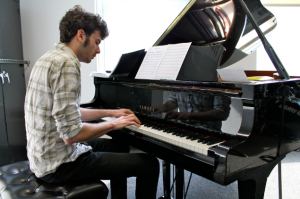For the Homeland, Students Put Lives on Hold
As the mounting tensions between North and South Korea continue to dominate the front pages of newspapers, for most students at The New School, the reports from a far-off land are just another headline. Yet for the 558 South Korean nationals who attend the University – the school’s largest international population – the possibility of war has long loomed on the horizon. “I am fearful of the way the government is handling the issue,” said Jong Yeol Bae, a Parsons Fashion Design student. “They would rather drive the country into a war than to try to make peace.”
Many South Korean students, including Bae, will be serving in the military in the coming years. As part of their legal duty as South Korean citizens, they must dedicate at least 21 months to military service. At present, a number of New School students are serving in their home countries’ armed forces – though university administrators could not provide precise statistics.
South Koreans are not the only international students facing mandatory military service. Among the New School’s nearly 11,000 undergraduate and graduate students, more than 1,200 come from countries such as Israel, Brazil, Taiwan, Austria, Colombia, Turkey, Iran and Russia—countries that all have mandatory military conscription.

The Free Press interviewed more than a dozen international students – natives of South Korea and Israel, two well-represented populations at The New School – about how they feel their past and potential military experience impacts their lives today.
At a time when many American high school students start looking into colleges, Israeli students begin thinking about what division of the military they would like to join. Around the same age, South Korean students, who are able to serve anytime between the ages of 18 and 35, must decide whether they would prefer to enlist before, during, or after college.
Although many students disagree with their home nation’s policy of mandatory military service, some speak of valuable and life-changing experiences during their period of service. These lessons, they told the *Free Press*, have even led them to greater performance as college students in New York City.
*****
Ji-Hoon Lee is a junior in the Fine Arts program at Parsons and will be leaving to join the South Korean military in August.
On a recent day, Lee sat relaxed, sharing his thoughts about the military, while sipping a large glass of beer. Unlike many other students interviewed by the *Free Press*, Lee spoke confidently about his approaching service, and did not display the slightest anxiety.
Having attended high school at Hardgrave Military Academy in Virginia, where he graduated as a Captain, the highest rank a student senior can attain, Lee said that he is accustomed to the military lifestyle.
Lee does not consider himself particularly patriotic, and like others, would prefer to stay in the United States with his girlfriend and continue his art studies at Parsons. But he thinks that there might be an upside to military service.
“It’s a little bit of a waste of time, but you never know what is going to happen,” he told the *Free Press*. “I’m probably going to meet up with different people my age, and I will also have this connection with South Korean culture.”
After seven years living in the U.S., Lee looks forward to reconnecting with his countrymen. He does not want to wait until he is too much older than the other soldiers.
“I’m probably [already] much older than many of the [soldiers] at twenty-two,” he said, estimating that most are under the age of 20. “It’s good to do it now because I will [still be able to] fit in,” he said.

impending military service. (Henry Miller)
Many other students interviewed for this article did not share Lee’s nonchalance. Few were ambivalent about the prospects of serving in the military.
Sang Won Jee, an architecture student, would rather stay in New York and complete his studies at Parsons.
“I want to keep [studying] until [I complete] graduate school, but it is really hard because of military service,” Jee wrote in an email to the *Free Press*. “In my opinion, it is a waste of time.”
While in the South Korean military, non-career soldiers do not earn a salary. Instead, in accordance with Korea Ministry of Government legislation, they earn a monthly stipend of between $70 and $92, which pales in comparison to the pay received in many volunteer armed services. In the U.S. military, soldiers starting pay is currently nearly $1,500 a month.
Beyond poor pay for their service, these student soldiers are forced to put their lives on hold – keeping in touch with friends and family, staying up-to-date with current events, or pursuing one’s own interests are virtually impossible. And many students believe that the military is a hindrance to their educational and long-term career goals.
Jong Yeol Bae, a Fashion Design student at Parsons from the central South Korean city of Daejeon, also plans to join the military this summer, just before his senior year. He has chosen to serve before graduating, as it might be difficult to return and obtain a new visa after leaving the country.
And like many South Korean students at The New School, he feels more equipped and ready to join the military than if he had joined shortly after graduating high school.
“I feel like I’m more mentally mature [now] to be able to handle it with less trauma,” Bae said. At the same time, he sees a downside to delaying his service. “I wish I’d gotten it over with as early as I could,” he said.
Bae does not think there are many tangible benefits to serving in the military. Like most of the South Korean nationals the *Free Press* spoke to, he feels that it is a burden.
“Unlike the U.S. Army, we don’t get paid, [we don’t get] scholarships,” he said. “I just think it’s wrong for the state to [force] a person into doing something they don’t want to do.”
*****
Unlike their South Korean counterparts, the Israeli students surveyed – who must serve at age 18 – did not view the military as much of a hindrance, but rather as an expression of their national identity, and an experience that aids their long-term career goals, and perhaps more surprisingly, their art.
“It was the grounding point for my adult responsibilities and behavior,” said Maayan Sherris, a junior Fashion Design student at Parsons. Sherris, a woman, had to do military service as she comes from Israel, one of the few countries that requires service of males and females. Although many Israeli women serve in combat, Sherris said that, beyond basic training, her primary duties included teaching and research.
“It gave me confidence and independence, and organizational skills and time management skills that today I see were important for me to gain at that age,” she said.
The transition back to civilian life, though, was challenging. “It’s a bit of a shock the minute you finish,” Sherris added. “Suddenly you don’t have that routine. Suddenly you can decide whatever you want.”
She decided after teaching for a year in her kibbutz, and traveling for some time following her military service, that she would like to pursue fashion design in the U.S.
Some Israeli students, like Sherris, take an artistic path at Parsons, but many also pursue music at the Jazz School.
For the past four years, the New School for Jazz has partnered with the Israeli Center for Jazz Studies. Students study at the partner-institute for two years and then spend two years at The New School.
Dor Heled, one student in the program, is a 26-year-old pianist. He is articulate, speaking with a measured calm in his voice, between swinging jazz numbers in class. Occasionally he breaks out into the Happy Birthday tune to provoke laughter as the mood grows tense during an ensemble class.
But before Heled began studying at The New School, he served in the Israeli navy as part of a submarine flotilla, and oversaw eight other young men. “It kind of runs in the family,” he said, referring to the fact that both his father and uncle also served in the navy.

Given the extensive training required for his position, he spent five years in the military instead of the regular three years required of males. Heled recognizes that he might be at a disadvantage by starting school so much later than many of his American peers. But he also sees military service as a cornerstone of Israeli culture.
“More than the fact that you have to do it, you kind of don’t want to not do it,” Heled said. “Then you would be excluding yourself from the very essence of being Israeli.”
He believes that his leadership position, along with the general responsibilities required of military service, benefit him as a musician. “I think the main advantage I have is that I can approach music with much more confidence.”
Martin Mueller, executive director of the New School for Jazz and Contemporary Music, also believes that serving in the military has a strong impact on the college experience of New School musicians, as well as on their music-careers.
“It is my personal opinion that the experience usually makes them stronger, and even more committed to their art and the need for personal expression and meaning,” Mueller wrote in an email to *The Free Press*, explaining that he had spoken of their time in military with a number of Jazz students.
“Given that the climb to prominence in the very competitive jazz community of New York is so demanding and arduous,” Mueller wrote, “coming out of the hardening fire of military training is usually a very good asset in knowing themselves, in working in total dedication and discipline in all their artistic and learning development.”
Israeli students often see their military service as an unfortunate, but necessary part of their country’s security. They would prefer a volunteer-based military, but feel that that is not a feasible option given Israel’s political situation. South Korean students, though having grown up in the shadow of North Korea, have not experienced war. Israelis, on the other hand, have.
“It is very unfortunate that military service is mandatory in Israel, I wish it wasn’t,” wrote Eran Sabo, a guitar-player at the Jazz school, in an email to the *Free Press*. “It causes hardships for many teenagers, prevents them for a while from growing and developing in their [preferred] direction, and isn’t easy financially. But, reality is tougher and more complicated and the mandatory service is a direct and inevitable result of Israel’s need to defend itself,” Sabo added.
Sabo’s military experience was somewhat atypical. He served under the title, “excellent musician,” (his translation) which meant that he only spent six hours a day on duty, ensuring that he could continue his music studies at the same time as he fulfilled his military duty.
“At the beginning of my service, for a few months, I played in a small combo which performed arrangements of Israeli songs, performed for soldiers, and [I also played] community performances at hospitals, elder homes, etc,” Sabo explained. Because of the inconsistency of his schedule, though, Sabo transferred to an office job.
Though many South Korean students voiced frustration about having to serve in the military, those who have returned to the New School noted that the military affected them in many of the same ways.
“I learned leadership [skills] and I have more confidence than before,” said Keum, a 25-year-old Fashion Design student who served in the South Korean military after his sophomore year. He served in a Korean unit augmented to the U.S. army and even wore an American military uniform. “The most important thing I really learned was how to control myself, [in terms of] time management and [prioritizing].”
Keum admitted that at first he was nervous when enrolling in the military, particularly because of South Korea’s reputation for arduous basic training. But after the experience, he feels a new sense of motivation and discipline.
“I learned to make everything possible,” Keum said with a smile. “It sounds funny, but nothing scares me now.”
With reporting by Sterling King, Henry Miller and Elizabeth Wu








Leave a Reply